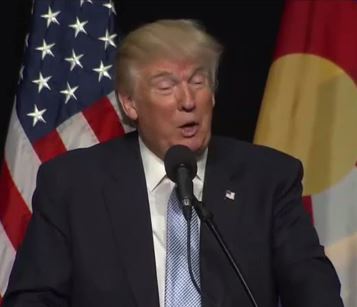 Senators Sheldon Whitehouse and Ted Cruz might team up to take on Donald Trump.
Senators Sheldon Whitehouse and Ted Cruz might team up to take on Donald Trump.
Rhode Island’s junior senator and Senator Chris Coons of Delaware, both members of the Senate Judiciary Committee, authored a letter to Cruz, the chairman of the Senate Judiciary Subcommittee on Oversight, Agency Action, Federal Rights and Federal Courts, asking him to hold hearings on Donald Trump’s recent “encouragement of a Russian cyber incursion of a U.S. presidential candidate.”
The two Democrats want the conservative Republican of Texas, an adversary of Trump’s, to “conduct an oversight hearing to determine whether existing federal criminal statutes and federal court jurisdiction sufficiently address conduct related to foreign entities that could undermine our elections,” according to the letter.
“Specifically,” reads the letter, “we ask that you consider whether requests for foreign entities to conduct cyber attacks on political opponents violate existing federal criminal statutes, and whether there are obstacles to the federal courts asserting jurisdiction to protect the integrity of our nation’s elections.”
No word yet on whether Cruz will agree to hold the hearings. While the climate change-denying Texan is no ally to Whitehouse, he may be a bigger enemy of Trump’s. When Cruz spoke at the Republican National Convention, he implored people to “vote your conscience” rather than voting for Trump, who purposefully interrupted Cruz’s speech. Before that, Trump insulted Cruz’s wife.
Read Whitehouse and Coon’s full letter to Cruz below:
Dear Chairman Cruz:
We write to express our concern regarding recent remarks made by presidential nominee Donald Trump and the threat of foreign influence in U.S. elections. On July 27, reporters asked Mr. Trump several questions regarding the cyber breach of the Democratic National Committee and potential Russian involvement. When asked if he would call on Russian President Vladimir Putin to stay out of the United States’ presidential election, Mr. Trump stated: “Russia, if you’re listening, I hope you’re able to find the 30,000 e-mails that are missing. . . . I think you will probably be rewarded mightily by our press.” Mr. Trump’s apparent encouragement of a foreign cyberattack on presidential nominee Hillary Clinton, a U.S. citizen and former Secretary of State, is dangerous and irresponsible. We ask that you conduct an oversight hearing to determine whether existing federal criminal statutes and federal court jurisdiction sufficiently address conduct related to foreign entities that could undermine our elections.
As two dozen national security experts stated in a recent letter calling for a congressional investigation, this is “not a partisan issue” but rather “an assault on the integrity of the entire American political process.” The “hacking of a political party’s email system by Russian intelligence agencies would, if proven, constitute unprecedented foreign interference in an American presidential campaign.”
Mr. Trump’s encouragement of a Russian cyber incursion of a U.S. presidential candidate represents an unprecedented call for a foreign government to spy on a U.S. citizen and interfere with a U.S. election. The threat Russia poses to cybersecurity has long been recognized as a national security issue, with a 2009 National Intelligence Estimate warning that Russia had the most “robust, longstanding program that combines a patient, multidisciplinary approach to computer network operations with proven access and tradecraft.” Recent Russian attempts to influence foreign elections – in Ukraine, Georgia, and France, for example – by engaging in cyberwarfare and orchestrated leaks are well documented. Mr. Trump’s comments implicate U.S. criminal laws prohibiting engagement with foreign governments that threaten the country’s interests, including the Logan Act and the Espionage Act. They threaten the privacy of a U.S. citizen and former government official, inviting Russia to engage in conduct that would violate the Computer Fraud and Abuse Act and, if performed by the U.S. government, would contravene the Fourth Amendment. Finally, Mr. Trump has invited foreign interference with the presidential election, which we believe should be carefully guarded against under U.S. law.
To ensure the integrity of the presidential election and its insulation from Russian cyber threats, we ask that you conduct an oversight hearing to consider whether existing federal criminal statutes and federal court jurisdiction sufficiently address conduct related to foreign entities that could undermine our elections. Specifically, we ask that you consider whether requests for foreign entities to conduct cyber attacks on political opponents violate existing federal criminal statutes, and whether there are obstacles to the federal courts asserting jurisdiction to protect the integrity of our nation’s elections.
Sincerely,
Christopher A. Coons Sheldon Whitehouse
United States Senator United States Senator
